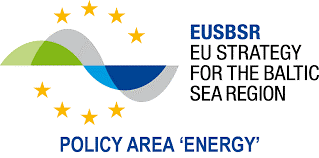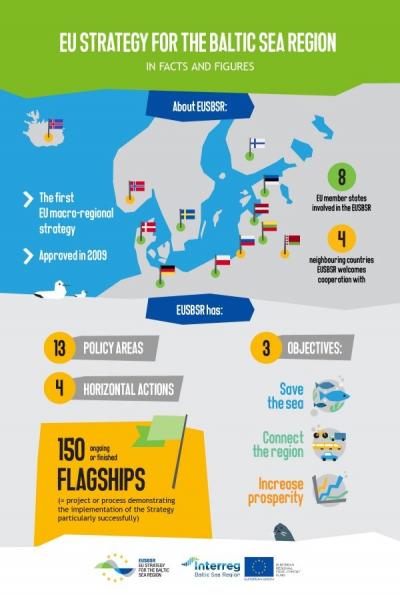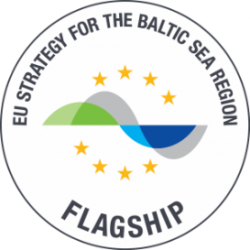|
EU Strategy for the Baltic Sea Region (EUSBSR) Policy Area (PA) ‘Energy’ focuses on ensuring competitive, secure and sustainable energy in the Baltic Sea region.
|
Video : What is the What is the EU Strategy for the Baltic Sea Region
The European Union Strategy for the Baltic Sea Region (EUSBSR) is the first Macro-regional Strategy in Europe. The Strategy was approved by the European Council in 2009 following a communication from the European Commission. It is divided into three objectives, which represent the three key challenges of the region: saving the sea, connecting the region and increasing prosperity. Each objective relates to a wide range of policies and has an impact on the other objectives. EUSBSR strives for a more intensive cooperation between the countries in the Baltic Sea Region in order to meet the common challenges and to benefit from common opportunities facing the region.
The EU member states involved in the EUSBSR are Sweden, Denmark, Estonia, Finland, Germany, Latvia, Lithuania and Poland. The EUSBSR implementation is coordinated in close contact with the European Commission and all relevant stakeholders, i.e. other member states, regional and local authorities, inter-governmental and non-governmental bodies. The Strategy is also welcoming cooperation with EU neighbouring countries (Russia, Iceland, Norway and Belarus).
The EUSBSR is implemented in concrete joint projects and processes. Projects and processes named Flagships of the EUSBSR demonstrate especially well the progress of the Strategy. However, no new funding or institutions have been founded to support the implementation of the Strategy. Instead, the EUSBSR, as all Macro-regional Strategies, is based on effective and more coordinated use of existing funding sources, and the promotion of synergies and complementarities.
For more information about the EUSBSR, please visit their website.
The Action Plan for the EU Strategy for the Baltic Sea Region reflects the three overall objectives of the EUSBSR – save the sea, connect the region and increase prosperity. The Action Plan comprises 13 Policy Areas and 4 Horizontal Actions, which represent the main areas where the EUSBSR can contribute to improvements, either by tackling the main challenges or by seizing key opportunities of the region.
Typically, one- or two-Member State(s) coordinate(s) each Policy Area or Horizontal Action, and they work on its implementation in close contact with the Commission and all stakeholders, i.e. other Member States, regional and local authorities, inter-governmental and non-governmental bodies.
Ministry of Economics of Latvia is the EUSBSR Policy Area (PA) ‘Energy’ coordinator. PA ‘Energy’ focuses on ensuring competitive, secure and sustainable energy in the Baltic Sea region. The aim of the PA Energy is to improve the implementation of the EUSBSR Action Plan and Baltic Energy Market Interconnection Plan (BEMIP). These two action plans have been merged together since 2015. Regional cooperation in the energy sector is conducted within the framework of the BEMIP plan, whose actions are to be implemented mainly in the areas of energy infrastructure, gas and electricity markets, power generation, security of energy supply, energy efficiency and renewable energy. Regarding electricity and gas markets the focus in on achieving open, competitive and fully integrated regional energy market in the Baltic Sea region.
Ministry of Economics of Latvia together with two other institutions* signed a contract with Interreg Baltic Sea Region for a technical assistance funding for supportive activities and coordination in EUSBSR PA Energy and PA Transport projects implementation. As PA ‘Energy’ coordinator Ministry of Economics of Latvia is planning, organizing and managing expert committee member meetings, as well as evaluating and providing support for PA ‘Energy’ regional projects and giving recommendations to the BEMIP member states for them to grant a flagship status to qualifying projects. The overall budget for the P1.008 Supportive Activities and Coordination in EUSBSR PA Energy and PA Transport project was 153 250.00 EUR (of which 61 000.00 EUR was for the Ministry of Economics of Latvia to coordinate the PA Energy). Time period for the project was from April 30, 2015 till September 30, 2016.
To continue the EUSBSR PA Energy coordination processes the Ministry of Economics of Latvia together with two other institutions** signed another contract with Interreg Baltic Sea Region for a technical assistance funding for the P015, Policy Area Energy/ Policy Area Transport (PAs Energy/ Transport) project. The overall budget for this project was 435 294.30 EUR (of which 200 000.00 EUR is for the Ministry of Economics of Latvia to coordinate the PA Energy). Time period for the project was from June 17, 2016 till October 31, 2018.
Currently PA ‘Energy’ is at its third funding period. Ministry of Economics of Latvia with its partners*** have signed another contract with Interreg Baltic Sea Region for a technical assistance funding for P024, Policy Area Energy/Policy Area Transport project. The overall budget for this project is 469 537.50 EUR
Time period for the project is from July 7, 2018 till December 31, 2020. For P024 it is expected to contribute to the main EU energy policy and Energy Union goals: improvements of the competitiveness and integration of the energy markets, implementation of the 2020 energy and climate strategy, which anticipates greenhouse gas emissions cut by 20%, increase the share of renewable energy for at least 20% and improved energy efficiency for 20%. The aim of the project is to work towards a fully integrated internal energy market; energy efficiency as a contribution to the moderation of energy demand; increase of the share of renewable energy; carbonization of the economy; and research, innovation.
For more information and news about the PA Energy please go to website: http://groupspaces.com/eusbsr-energy/
* Project partners for the P1.008 Supportive Activities and Coordination in EUSBSR PA Energy and PA Transport project – Danish Energy Agency (former PA Energy co-coordinators) and Ministry of Enterprise and Innovation (PA Transport coordinator)
** Project partners for P015, Policy Area Energy/ Policy Area Transport project - Ministry of Enterprise and Innovation (PA Transport coordinator) and Vilnius Gediminas Technical University (PA Transport coordinator)
***Project partner for P024, Policy Area Energy/Policy Area Transport project – Ministry of Foreign Affairs of the Republic of Lithuania, Ministry of Infrastructure of Sweden and Vilnius Gediminas Technical University (Lithuania).
The actions of the EU Strategy for
|
EU funded EUSBSR PA Energy Flagships
|
the Baltic Sea Region are implemented by means of Flagships. Flagships demonstrate the progress of the Strategy and may serve as pilot examples for desired action. Flagships have a macro-regional impact and develop joint initiatives involving partnership from different countries.
Completed flagships:
- Effect4buildings
The goal of EFFECT4buildings is to increase the number of energy efficiency measures implemented in existing public buildings in the Baltic Sea Region. The target group is public building managers who often know what actions are technically possible and sometimes have calculations that show that these investments are profitable, but despite that fails to implement the measures due to financial barriers. The project will result in a toolbox with financial methods that can improve profitability, facilitate funding and reduce the risk of energy investment in public real estate.
More information: http://www.effect4buildings.se/en/Pages/About.aspx
- ActNow
The project tackles energy efficiency in the existing building stock of smaller and larger cities around the Baltic Sea. The project’s aim is to help municipal staff involved in energy efficiency measures by improving their knowledge about energy losses, competences for preparing investments, and skills to stimulate private investments in energy efficiency.
More information: https://actnow-baltic.eu/
- BalticInteGrid
Baltic InteGrid (Integrated Baltic Offshore Wind Electricity Grid Development) has been developing a professional network and providing fora for expertise exchange and state-of-the-art interdisciplinary research on the optimisation potential of offshore wind energy in the Baltic Sea Region by applying the meshed grid approach.
More information: http://www.baltic-integrid.eu/
- USE-LBM-BioPro
Project - Use of liquefied biogas from waste (LBM) as gasoline substitute including side product utilization for Biopolymer production aimed to address the use of Liquid Bio-Methane (LBM) in combustion engines for transportation purposes. Therefore the whole production circle as well as the related car technology is in the focus of the project. Next to the production of LBM, the improvement of storage and handling capacities of LBM and the adaptation of car technology for the use of LBM is addressed as well as the infrastructure and filling technology.
The Interreg Baltic Sea Region Programme 2014-2020 supports integrated territorial development and cooperation for a more innovative, better accessible and sustainable Baltic Sea region. Partners from countries around the Baltic Sea work together in transnational projects on common key challenges and opportunities. The Programme funds projects in four thematic fields, known as Priorities:
- Priority 1, “Capacity for innovation”, offers support for e.g. development of innovation infrastructures, implementation of smart specialization strategies and development of non-technological innovations.
- Priority 2, “Efficient management of natural resources”, highlights the need to manage natural resources more efficiently. Resource efficient blue growth, renewable energy sources, energy efficiency and clear waters are areas that receive support.
- Priority 3 concentrates on “Sustainable transport”. Here projects covering themes such as interoperability, accessibility of remote areas, maritime safety, environmentally friendly shipping and urban mobility are supported.
- Priority 4, offers funding to Seed Money projects of the EU Strategy. In addition, it supports the coordination of the EU Strategy for the Baltic Sea Region the stakeholders of the Strategy: here assistance to the Priority Area Coordinators and Horizontal Action Leaders, organization of Strategy Forums and other implementation tasks are co-financed.
In the framework of the programming period 2014 – 2020, Interreg Baltic Sea Region is co-financing 60 flagship projects with EUR 136.1 million coming from the European Regional Development Fund (ERDF).
To find information on all projects funded by Interreg Baltic Sea Region, go to the Project Library: https://projects.interreg-baltic.eu/[ES1]
CAMS Platform
CAMS Platform aims to capitalize results of ongoing EU INTERREG and other EU energy efficiency projects. The platform will explore how energy efficiency measures could be improved and used to increase the resilience of housing sector to negative effects of long-term climate change; how energy audits could be upgraded to serve relevant measures, developing accessible database for energy performance audits of buildings, especially the unified energy performance criteria for multi-storey buildings. Platform tackles the issue of how to use available financial sources better for achieving climate goals by developing policy recommendations for planning ESIF in coming EU MFF 2021-2027 and guidelines for further energy efficiency (EE) projects, so to create synergy between EE and climate change mitigation and adaptation.
Project partners: Tartu Regional Energy Agency (Estonia), County Administrative Board of Dalarna (Sweden), Permanent International Secretariat of the Council of the Baltic Sea States (Sweden), Ministry of Economics (Latvia), Foundation of Energy Saving in Gdansk (Poland), Baltic Environmental Forum (Latvia), Baltic Environmental Forum (Germany), Stockholm Environment Institute Tallinn Centre (Estonia), Peter the Great St. Petersburg Polytechnic University (Russia).
Project duration: August 2019 till September 2021
Total budget: 1.05 million EUR
Budget for Ministry of Economics: 112 065 EUR
More information: https://projects.interreg-baltic.eu/projects/cams-platform-207.html
Baltic Leadership Programme on Energy Efficiency
The Baltic Leadership Programme on Energy Efficiency is a tailor-made programme with the aim to develop actions, tools and methods for increased energy efficiency in the Baltic Sea region. A special focus will be on the building sector, since it accounts for 40 % of the energy consumption and 36 % of the CO2 emissions in the European Union.
The programme will result in both a transnational approach and a network for energy efficiency in the Baltic Sea region. As a participant you will get new knowledge and leadership skills on how to design and lead processes, facilitate multi-sector stakeholder dialogues, as well as to plan actions for awareness raising and attitude and behaviour change.
The BLP on Energy Efficiency is commissioned by the Swedish Institute in close cooperation with the Ministry of Economics of the Republic of Latvia in its capacity of Policy Area Energy and the CBSS Secretariat in its capacity as Horizontal Action Climate for the EU Strategy for the Baltic Sea Region.
Objectives
- Increase participants’ understanding of the importance of sustainable energy use and develop collaborative competence for action planning and troubleshooting, especially in the housing sector, for energy final use;
- Develop capacity, through tools and methods, for awareness raising and changing attitudes and behavior;
- Explore and learn techniques for facilitating development through transnational networks and multi-sector stakeholder dialogues;
- Draft models for cooperation and to design a transnational process for increased energy efficiency in the Baltic Sea Region.
The programme consists of 2 digital and 2 physical modules implemented during the autumn of 2019 and winter of 2020. Each module will have its own focus contributing to a coherent and structured process. The meetings will circulate between different countries. Simultaneously, throughout the entire run of the programme, a learning portal will be used for discussions, group work and information sharing.
Module1: Purpose & road map – Digital kick-off on 15 November 2019
Module2: Sustainable energy management (efficient final use) – in Stockholm on 2-4 Dec. 2019
Module3: Action planning & troubleshooting – Webinar on 10 January 2020
Module4: Designing cooperation – in Riga on 10-12 February 2020
More information: https://si.se/en/apply/leadership-programmes/baltic-leadership-programme-on-energy-efficiency/
CAMS Platform is part-financed by the European Union (European Regional Development Fund and European Neighbourhood Instrument) as part of the Interreg Baltic Sea Region Programme 2014-2020, Priority 2 “Natural resources”, Specific objective 2.3 “Energy efficiency”.






